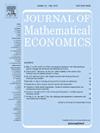没有承诺的过度自信和道德风险
IF 0.7
4区 经济学
Q3 ECONOMICS
引用次数: 0
摘要
我们研究了在有限承诺的道德风险环境下过度自信的影响。有限承诺是昂贵的,因为在代理人选择了他的努力水平后,委托人总是会重新谈判到最优的风险分担合同。这意味着当委托人和代理人具有相同的信念时,在纯策略中不可能实现高于最小值的努力水平。在过度自信的情况下,最优风险分担契约提供收益增加的支付以利用代理人的过度自信。在均衡状态下,代理人预期到剥削契约并愿意选择高于最小努力。提供代理人租金可以增加最优风险分担契约的斜率,从而扩大可执行的努力水平集合。在混合策略均衡中,过度自信同时降低了次优契约的风险,增加了最优风险分担契约的风险,增加了均衡中高努力的概率。本文章由计算机程序翻译,如有差异,请以英文原文为准。
Overconfidence and moral hazard without commitment
We examine the implications of overconfidence in a moral hazard setting with limited commitment. Limited commitment is costly because the principal will always renegotiate to the optimal risk-sharing contract after the agent chooses his effort level. This means that no effort level above the minimum can be implemented in pure strategies when the principal and the agent have homogeneous beliefs. With overconfidence, the optimal risk-sharing contract provides payments that increase in outcome to exploit the agent’s overconfidence. The agent anticipates the exploitative contract and willingly chooses higher than minimum effort in equilibrium. Providing the agent rent can increase the slope of the optimal risk-sharing contract and, therefore, expand the set of implementable effort levels. In a mixed-strategy equilibrium, overconfidence simultaneously decreases the risk in the second-best contract and increases the risk in the optimal risk-sharing contract, increasing the probability of high effort in equilibrium.
求助全文
通过发布文献求助,成功后即可免费获取论文全文。
去求助
来源期刊

Journal of Mathematical Economics
管理科学-数学跨学科应用
CiteScore
1.70
自引率
7.70%
发文量
73
审稿时长
12.5 weeks
期刊介绍:
The primary objective of the Journal is to provide a forum for work in economic theory which expresses economic ideas using formal mathematical reasoning. For work to add to this primary objective, it is not sufficient that the mathematical reasoning be new and correct. The work must have real economic content. The economic ideas must be interesting and important. These ideas may pertain to any field of economics or any school of economic thought.
 求助内容:
求助内容: 应助结果提醒方式:
应助结果提醒方式:


